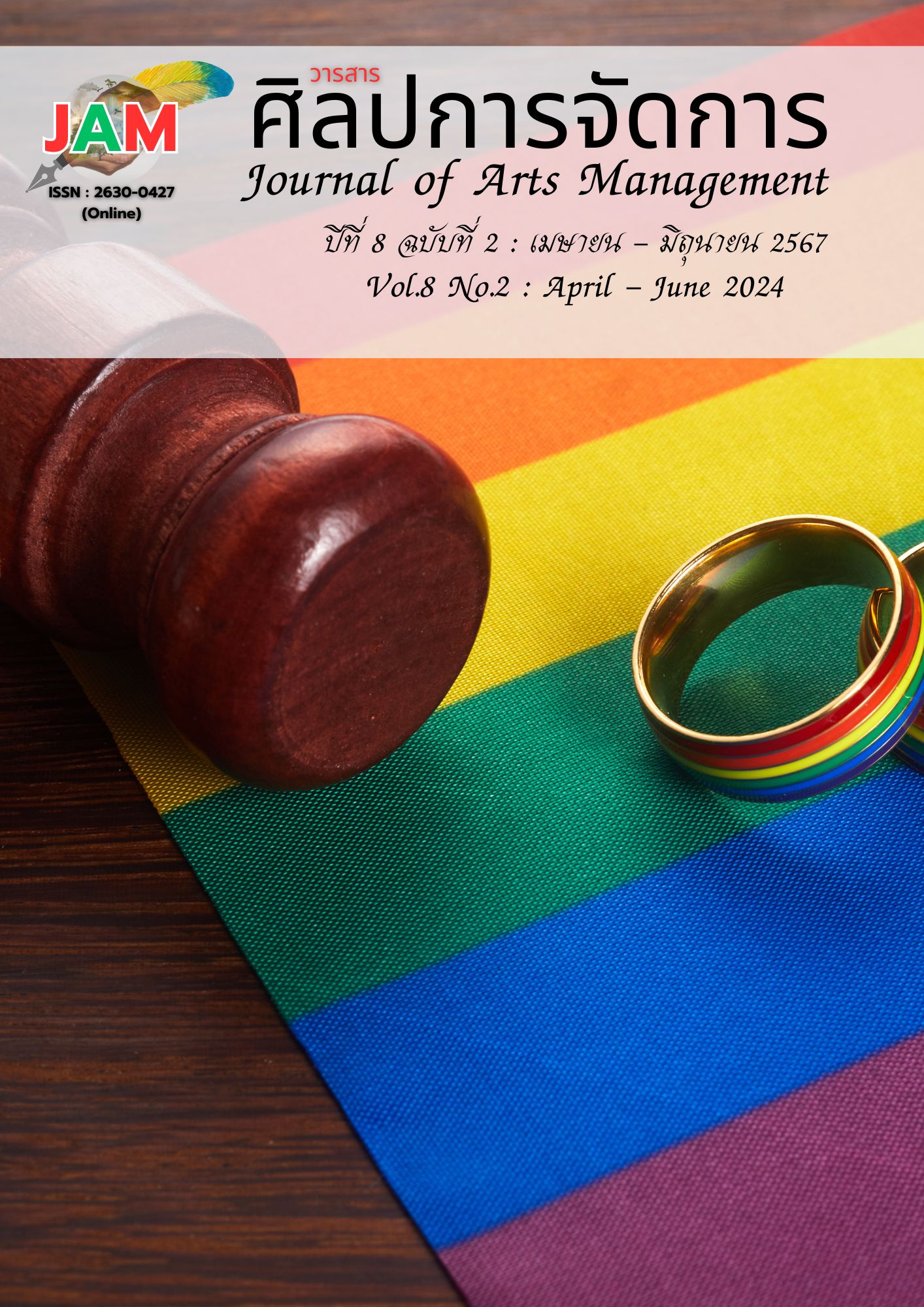The Development of Social Responsibility Characteristics Using Electronic Story Books with Students in Grade 2 at Srinakharinwirot University Prasarnmit Demonstration School (Elementary)
Main Article Content
Abstract
The purposes of this research are as follows: 1) to develop an electronic storybook to promote social responsibility characteristics 2) to evaluate the effectiveness and outcomes of the electronic storybook and 3) to promote social responsibility characteristics of students. The research sample consists of students from Grade 2, Satit Prasarnmit Primary School, totaling 60 students from 2 selected classes out of 8, with 30 students per class. Data collection tools included electronic storybooks, "The Floating Lantern with the Big Brother Kla and the little sister Keaw," a suitability assessment questionnaire for electronic storybooks, an academic performance test, and social responsibility characteristics measurement. Statistical analysis used included mean, standard deviation, and intergroup non-independent t-test statistics. The research results found the following: 1. The quality of the developed electronic storybook is very good (x̄ = 4.53, S.D. = 0.39). 2. The electronic storybook has an effectiveness of 80.56/88.89, which is higher than the effectiveness criterion of 80/80, and has an impact index of 0.43. 3. The characteristics of social responsibility of targeted students in all three aspects, overall at a frequent practice level (x̄ = 4.45, S.D.= 0.64). This is demonstrated as follows: Aspect 1: Most students have a high frequency of self-responsibility (x̄ = 4.16, S.D.= 0.80). Aspect 2: Most students exhibit regular responsibility towards others (x̄ = 4.53, S.D.= 0.63). And in Aspect 3: Most students consistently demonstrate responsibility towards society and the environment (x̄ = 4.65, S.D.= 0.48). Furthermore, the average learning outcome scores of students' post-learning academic performance test scores are significantly increased to 0.01 level of significance.
Article Details

This work is licensed under a Creative Commons Attribution-NonCommercial-NoDerivatives 4.0 International License.
Views and opinions appearing in articles in the Journal of Arts of Management It is the responsibility of the author of the article. and does not constitute the view and responsibility of the editorial team I agree that the article is copyright of the Arts and Management Journal.
References
Baipho, P. (2021). Development of Storytelling with Creative Drama Activity Package to Enhance Relationship Skills of Primary School Students[Master's thesis, Chulalongkorn University].
Baker, D. (1992). Language testing: A critical survey and practical guide. Athenaeum Press.
Binsamaae, S., & Hayeeteh, P. (2022). The Development of Electronic Bilingual Folklore Books for the Students of Government Primary School of Intensive Islamic-studies Curriculum in Southern Border. Journal of Pacific Institute of Management Science, 8(2), 187-196.
Chukaeo, D. (2020). Development of Multimedia Electronic Books Combined with Inquiry-Based Learning for Disaster Preparedness and Risk Awareness for 1st Year High School Students at Ban Nasan School. Journal of Educational Research Srinakharinwirot University, 15(1), 12-26.
Department of Mental Health. (2022). National Mental Health Development Plan No. 1 (2018-2037). Department of Mental Health.
Intasik, S. (2017). Criticizing courses in the master of education program in curriculum, teaching, and learning technology, Chiang Mai University by using 3 characteristics framework. Journal Kasetsart Educational Review, 32(1).
Kaison, Y., Khunmathurot, S., & Ongartwanich, N. (2022). Electronic Tale Book “Largesse” to Promote Reading Interpretation by Using Learning Management with Team Assisted Individualization (Tai) Technique for Matthayomsuksa 3 Students. Journal of Education and Innovation, 24(4), 221-231.
Korat O, Tourgeman M., & Segal-Drori O. (2022). E-book reading in kindergarten and story comprehension support. Reading & Writing, 35(1), 155–75.
Kultangwatthanakul, W. (2019). The Effects of Using Electronic Book Media to Promote Attitudes in Self-Healthcare among Elderly Members of a Senior Citizens’ Club[Master's thesis, Srinakharinwirot University].
Laohajaratsang T. (2018). Innovative educational information technology for Thailand 4.0 Era. Tongsam Design.
Meng, Li. (2022). Development of Interactive Electronic Book Formats with Augmented Reality Technology Using Gamification Concepts to Enhance Vocabulary Retention in Chinese Language for Elementary School Students[Doctoral dissertation, Srinakharinwirot University].
Mongkolsang, N. (2021). Storybook Animation Electronic Media Development to Promote Morality and Ethics of Kindergarten 3 (5-6 Years). Journal of Humanities and Social Sciences Phranakhon Si Ayutthaya Rajabhat University, 9(1), 36–60.
National Council for the Social Studies. (2023, November). New Definition of Social Studies Approved. https://www.socialstudies.org/media-information/definition-social-studies-
Pantongruk, K., & Meesuwan, W. (2020). The develop and find efficiency of folk storybooks with people images to strengthen language development for young children. Education and Communication Technology Journal, 15(19), 60-72.
Phinla, W. & Phinla, W. (2018). Learning management social studies in the 21st century. Chulalongkorn University.
Raksad, S. (2022). Reinforcement of Cooperate Social Responsibility of Graduate School, Mahamakut Buddhist University. Journal of Palisueksabuddhaghosa Review, 6(1).
Sanguanpunyasiri. N. (2020). The effect of using interactive E-book in ecosystem subject of mattayomsuksa 3 students[Master's Thesis, Silpakorn University].
Saitamlueng. T. (2022). Effects of story-based learning activities together with artistic creation on listening abilities and creativity of kindergarten 2 students[Master's Thesis, Mahasarakham University].
Sittachan, K. (2020). Image Service Quality and Social Responsibility affecting Customer Decision to use a Private Parcel Delivery Company in Bangkok. Bangkok University.
Somhiran, C. (2020). Enhancing Social Responsibility of 6th Grade Elementary School Students through Group Counseling[Master's thesis, Srinakharinwirot University].
Sukbua, A. (2020) Development of electronic media for self learning on the visual arts reflecting life for sixth grade students at Phyathai School[Master's thesis, Srinakharinwirot University].
Thanompongchart, P. (2019). The development of English achievements and moral of grade 4 and 5 students by using Aesop's fables and the Cornell note taking method. Chulalongkorn University. https://cuir.car.chula.ac.th/bitstream/123456789/62950/3/Phasphan_Th_Res_2562.pdf
Tooprioa, P. (2021). The Development of Curriculum Approach to Enhance Entrepreneur Competence and Corporate Social Responsibility for Upper Secondary School Students[Master's thesis, Srinakharinwirot University].
Waibanthao, W. (2020). Learning Management by Using Tales to Develop Thai Reading Abilities of Grade 1 Students[Master's Thesis, Rungsit University].
Yalcin, A., & Gulec, S. (2022). The Effect of Responsibility-Based Activities in Social Studies Course on Gaining the Value of responsibility to students. European Journal of Educational Sciences, 9(2), 74-89.
Yoonpun, k. (2017). The study of Thai children literature written from 2455 B.E. to 2555 B.E. Srinakharinwirot Research and Development Journal, 9(17), 14-22. https://ejournals.swu.ac.th/index.php/swurd/article/view/8969/7728


